-
 Bitcoin
Bitcoin $104,556.3858
1.98% -
 Ethereum
Ethereum $2,692.7351
8.56% -
 XRP
XRP $2.5830
1.93% -
 Tether USDt
Tether USDt $1.0002
-0.01% -
 Solana
Solana $182.4433
6.02% -
 BNB
BNB $665.5619
0.58% -
 USDC
USDC $1.0000
-0.03% -
 Dogecoin
Dogecoin $0.2388
4.20% -
 Cardano
Cardano $0.8312
2.26% -
 TRON
TRON $0.2717
-0.90% -
 Sui
Sui $4.0661
2.84% -
 Chainlink
Chainlink $17.5998
5.68% -
 Avalanche
Avalanche $25.8714
4.49% -
 Stellar
Stellar $0.3161
0.78% -
 Shiba Inu
Shiba Inu $0.0...01637
4.75% -
 Hedera
Hedera $0.2169
1.89% -
 Pi
Pi $1.2426
6.82% -
 Hyperliquid
Hyperliquid $26.1587
7.12% -
 Toncoin
Toncoin $3.4160
2.44% -
 Bitcoin Cash
Bitcoin Cash $415.0306
1.28% -
 Polkadot
Polkadot $5.2123
2.61% -
 UNUS SED LEO
UNUS SED LEO $8.7098
1.88% -
 Litecoin
Litecoin $104.7936
2.93% -
 Monero
Monero $342.1434
1.46% -
 Pepe
Pepe $0.0...01472
8.67% -
 Bitget Token
Bitget Token $4.7976
0.92% -
 Dai
Dai $0.9999
-0.01% -
 Ethena USDe
Ethena USDe $1.0008
-0.01% -
 Uniswap
Uniswap $7.1771
3.94% -
 Bittensor
Bittensor $465.5779
2.96%
How to improve the security of backup files through distributed storage technology?
Distribute your crypto backups across multiple nodes for enhanced security, using robust encryption and carefully vetting providers; regular audits are crucial for ongoing protection.
Mar 02, 2025 at 04:24 pm
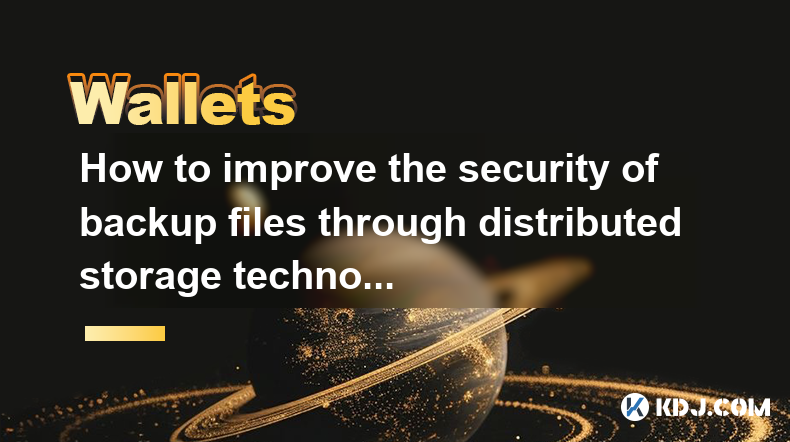
Key Points:
- Utilizing distributed storage for cryptocurrency backup enhances security by eliminating single points of failure.
- Different distributed storage solutions offer varying levels of security and decentralization.
- Implementing robust encryption methods is crucial for securing data even within a distributed network.
- Careful selection of providers and understanding their security protocols is vital.
- Regularly auditing and updating your security measures is essential for ongoing protection.
How to Improve the Security of Backup Files through Distributed Storage Technology?
The security of cryptocurrency backup files is paramount. Losing access to your private keys means losing your funds. Traditional methods, like storing backups on a single hard drive or cloud service, are vulnerable to theft, hardware failure, and single points of failure. Distributed storage technology offers a compelling alternative, spreading your backups across multiple nodes, thereby significantly enhancing security.
Understanding Distributed Storage for Cryptocurrency Backups
Distributed storage systems replicate your backup files across a network of geographically dispersed nodes. This redundancy means that even if some nodes fail or are compromised, your data remains accessible from other nodes. This inherent redundancy is a significant improvement over centralized storage. Several different distributed storage solutions exist, each with its own security characteristics. Choosing the right one depends on your specific needs and risk tolerance.
Choosing a Suitable Distributed Storage Solution
The market offers several options for distributed storage, each with different strengths and weaknesses. Some popular choices include IPFS (InterPlanetary File System), Sia, and Arweave. IPFS is known for its decentralized nature and content addressing, while Sia uses a blockchain-based approach for data storage and retrieval. Arweave focuses on permanent storage, making it attractive for long-term backups. Consider factors like cost, ease of use, and security features when making your selection.
Implementing Robust Encryption
Even with distributed storage, encryption is crucial. Your backup files should be encrypted before being uploaded to the distributed network. This ensures that even if a node is compromised, the attacker won't be able to access your private keys. Strong encryption algorithms, like AES-256, are essential. Remember to securely manage your encryption keys; losing them renders your backups inaccessible.
Security Considerations for Different Distributed Storage Providers
Before entrusting your cryptocurrency backups to any distributed storage provider, carefully investigate their security protocols. Look for providers that employ robust encryption, regularly audit their systems, and have a transparent security policy. Consider providers with a proven track record and a strong community. Remember that even decentralized systems can have vulnerabilities, so due diligence is critical.
Beyond the Technology: Practical Security Measures
While distributed storage offers significant security improvements, it's not a silver bullet. Several other best practices should be implemented. These include:
- Multiple Backups: Don't rely on a single distributed storage solution. Use multiple providers or methods to ensure redundancy.
- Offline Backups: Maintain offline backups on physical media (e.g., a hardware wallet or encrypted USB drive) for an additional layer of security.
- Strong Passwords/Key Management: Use strong, unique passwords or implement robust key management practices for your encryption keys and access credentials.
- Regular Audits: Regularly review your security measures to ensure they remain effective and adapt to evolving threats.
- Two-Factor Authentication: Employ two-factor authentication (2FA) wherever possible to add an extra layer of security to your accounts.
Multi-Signature Wallets and Distributed Storage
Consider integrating multi-signature wallets with your distributed storage strategy. This requires multiple parties to authorize transactions, significantly reducing the risk of unauthorized access, even if one of your backup locations is compromised. This adds a further level of protection beyond simply securing the backup itself.
The Role of Blockchain Technology in Secure Backups
Some distributed storage solutions leverage blockchain technology for enhanced security and transparency. Blockchain's immutability can provide a verifiable record of your backups, making it more difficult to tamper with or delete them. However, even blockchain-based systems require careful consideration of their security features and potential vulnerabilities.
Addressing Common Security Concerns
While distributed storage enhances security, it's not foolproof. Understanding potential vulnerabilities and implementing mitigation strategies is vital. Always stay informed about emerging threats and update your security practices accordingly.
Frequently Asked Questions:
Q: Is distributed storage completely secure?
A: No technology is completely secure. While distributed storage significantly reduces the risk of data loss compared to centralized solutions, it still has vulnerabilities that need to be addressed through robust encryption, careful provider selection, and multiple backup strategies.
Q: What happens if a distributed storage provider goes bankrupt?
A: The impact depends on the provider and your backup strategy. Some providers may offer data recovery services even after bankruptcy, but this isn't guaranteed. Having backups with multiple providers mitigates this risk.
Q: How do I choose the right distributed storage provider?
A: Consider factors like reputation, security features (encryption, data redundancy), cost, ease of use, and community support. Research thoroughly before selecting a provider.
Q: How expensive is distributed storage for cryptocurrency backups?
A: Costs vary depending on the provider and the amount of data you need to store. Some providers offer free tiers, while others charge based on storage capacity and bandwidth usage.
Q: Can I use distributed storage for all my cryptocurrency backups?
A: Yes, you can. However, remember that different storage solutions might suit different needs and the level of security required for each type of data (e.g., seed phrases versus transaction history).
Q: How often should I update my backup security measures?
A: Regularly reviewing and updating your security measures is crucial. This includes checking for software updates, reviewing encryption keys, and staying informed about emerging threats. A yearly review is a good starting point, but more frequent checks may be necessary.
Disclaimer:info@kdj.com
The information provided is not trading advice. kdj.com does not assume any responsibility for any investments made based on the information provided in this article. Cryptocurrencies are highly volatile and it is highly recommended that you invest with caution after thorough research!
If you believe that the content used on this website infringes your copyright, please contact us immediately (info@kdj.com) and we will delete it promptly.
- Bitcoin Has Officially Crossed the $100k Mark
- 2025-05-14 05:05:13
- Dogecoin (DOGE) Is Poised for a Possible Price Jump After Creating a Bullish Pennant Pattern
- 2025-05-14 05:05:13
- USDY (USDY) token has just landed on TruBit, providing Treasury-backed yields
- 2025-05-14 05:00:13
- As Hype-Driven Meme Coins Lose Steam, Utility-Driven Projects Are Finally Taking the Spotlight
- 2025-05-14 05:00:13
- Why Investors Are Watching Dragoin Over Aptos, and VeChain Right Now?
- 2025-05-14 04:55:12
- Bitcoin Solaris (BTC-S): The Future of Decentralized Wealth Is Here
- 2025-05-14 04:55:12
Related knowledge
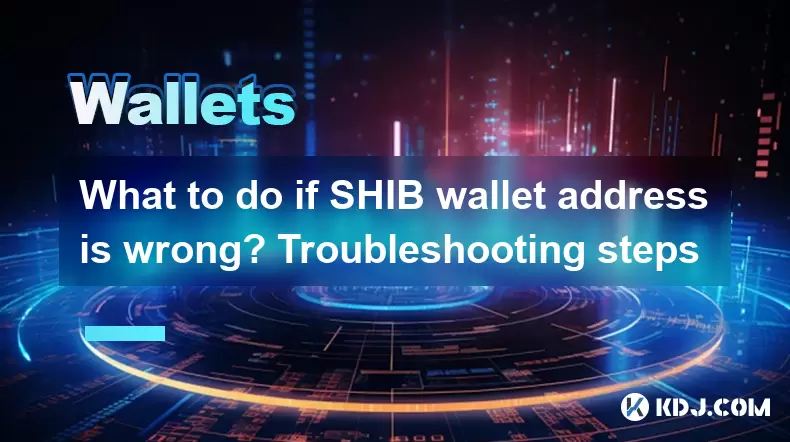
What to do if SHIB wallet address is wrong? Troubleshooting steps
May 14,2025 at 04:28am
If you've entered the wrong SHIB wallet address, it can be a stressful situation, especially if you've already sent your SHIB tokens. However, there are several steps you can take to troubleshoot and potentially resolve the issue. Let's walk through the process step-by-step. Verify the Transaction DetailsThe first thing you should do is verify the trans...
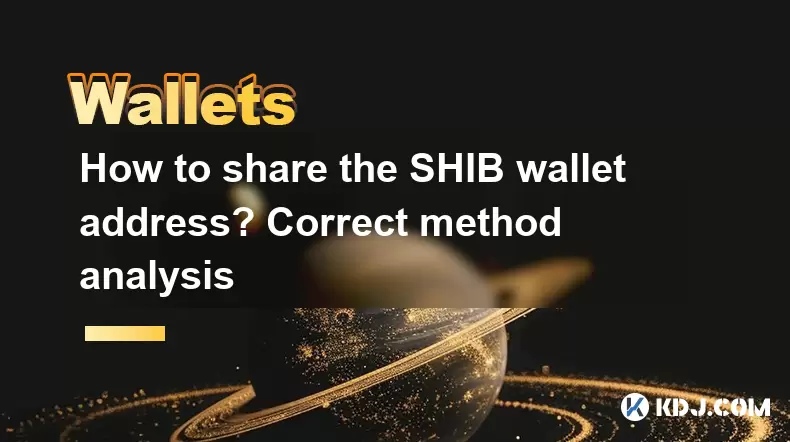
How to share the SHIB wallet address? Correct method analysis
May 14,2025 at 02:50am
Sharing your SHIB wallet address is a common task for those involved in the cryptocurrency world, particularly if you're dealing with Shiba Inu (SHIB) tokens. However, it's crucial to understand the correct methods to share your wallet address to ensure the safety and security of your funds. This article will guide you through the process and highlight ...
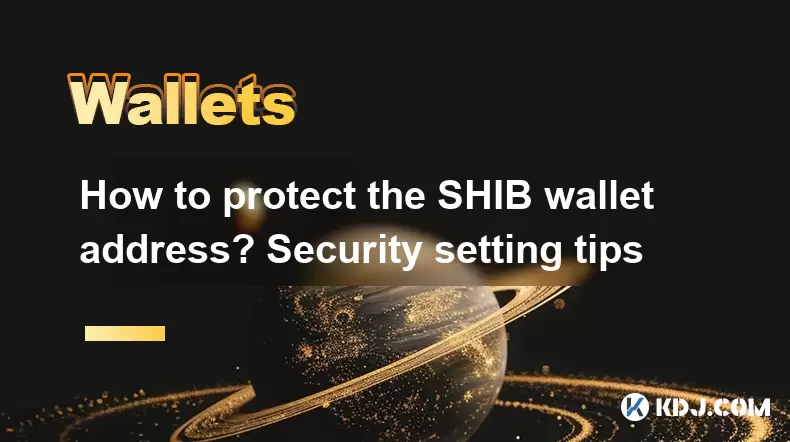
How to protect the SHIB wallet address? Security setting tips
May 13,2025 at 04:07pm
Protecting your SHIB wallet address is crucial to safeguarding your cryptocurrency assets. With the rise of digital currencies, securing your wallet has become more important than ever. This article will provide you with detailed security setting tips to ensure your SHIB wallet remains safe from potential threats. Understanding SHIB Wallet SecurityBefor...
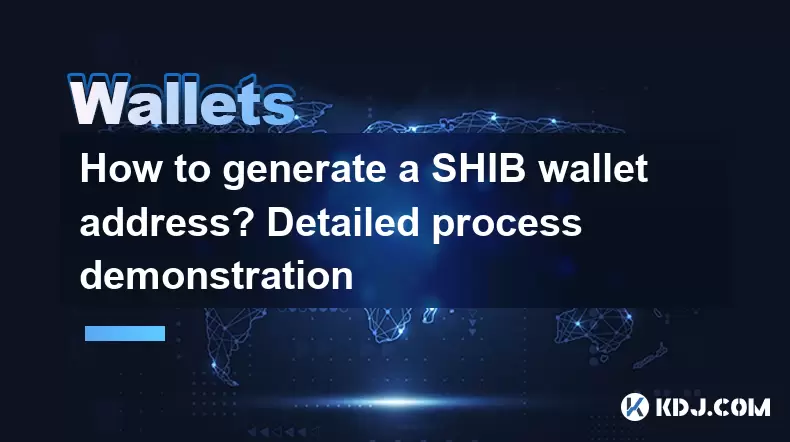
How to generate a SHIB wallet address? Detailed process demonstration
May 13,2025 at 08:43pm
Creating a SHIB (Shiba Inu) wallet address is a straightforward process that allows you to securely store, send, and receive SHIB tokens. This article will guide you through the detailed steps to generate a SHIB wallet address using popular methods such as MetaMask and Trust Wallet. Let's dive into the process. Choosing a Wallet PlatformBefore you can g...
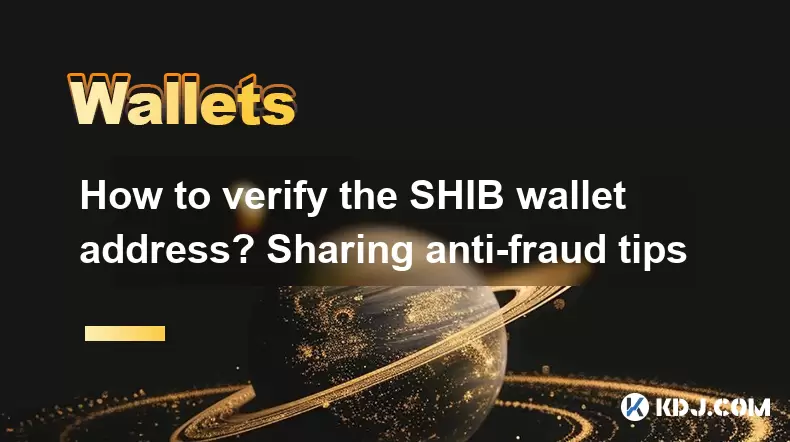
How to verify the SHIB wallet address? Sharing anti-fraud tips
May 13,2025 at 08:56pm
Verifying a SHIB (Shiba Inu) wallet address and protecting yourself from fraud are crucial steps in managing your cryptocurrency safely. This article will guide you through the process of verifying your SHIB wallet address and share essential anti-fraud tips to ensure your digital assets remain secure. Understanding SHIB Wallet AddressesBefore diving in...
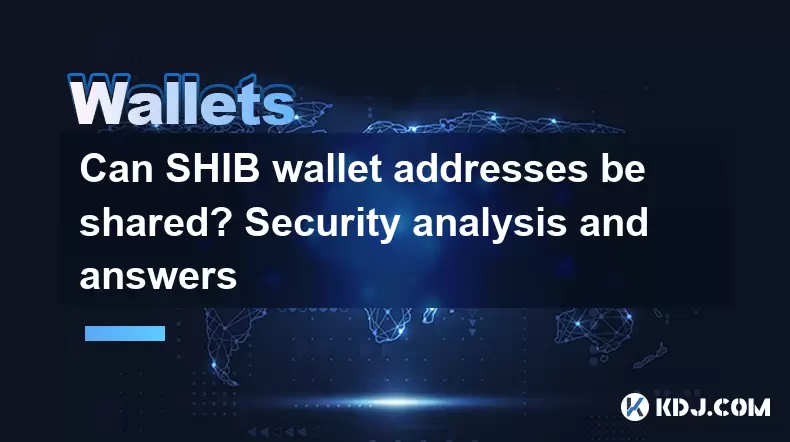
Can SHIB wallet addresses be shared? Security analysis and answers
May 14,2025 at 04:57am
Introduction to SHIB Wallet AddressesSHIB, or Shiba Inu, is a cryptocurrency that has gained significant attention within the crypto community. As with any cryptocurrency, the security of your assets is paramount, and this begins with understanding the nature of SHIB wallet addresses. A wallet address is a unique identifier used to send and receive SHIB...

What to do if SHIB wallet address is wrong? Troubleshooting steps
May 14,2025 at 04:28am
If you've entered the wrong SHIB wallet address, it can be a stressful situation, especially if you've already sent your SHIB tokens. However, there are several steps you can take to troubleshoot and potentially resolve the issue. Let's walk through the process step-by-step. Verify the Transaction DetailsThe first thing you should do is verify the trans...

How to share the SHIB wallet address? Correct method analysis
May 14,2025 at 02:50am
Sharing your SHIB wallet address is a common task for those involved in the cryptocurrency world, particularly if you're dealing with Shiba Inu (SHIB) tokens. However, it's crucial to understand the correct methods to share your wallet address to ensure the safety and security of your funds. This article will guide you through the process and highlight ...

How to protect the SHIB wallet address? Security setting tips
May 13,2025 at 04:07pm
Protecting your SHIB wallet address is crucial to safeguarding your cryptocurrency assets. With the rise of digital currencies, securing your wallet has become more important than ever. This article will provide you with detailed security setting tips to ensure your SHIB wallet remains safe from potential threats. Understanding SHIB Wallet SecurityBefor...

How to generate a SHIB wallet address? Detailed process demonstration
May 13,2025 at 08:43pm
Creating a SHIB (Shiba Inu) wallet address is a straightforward process that allows you to securely store, send, and receive SHIB tokens. This article will guide you through the detailed steps to generate a SHIB wallet address using popular methods such as MetaMask and Trust Wallet. Let's dive into the process. Choosing a Wallet PlatformBefore you can g...

How to verify the SHIB wallet address? Sharing anti-fraud tips
May 13,2025 at 08:56pm
Verifying a SHIB (Shiba Inu) wallet address and protecting yourself from fraud are crucial steps in managing your cryptocurrency safely. This article will guide you through the process of verifying your SHIB wallet address and share essential anti-fraud tips to ensure your digital assets remain secure. Understanding SHIB Wallet AddressesBefore diving in...

Can SHIB wallet addresses be shared? Security analysis and answers
May 14,2025 at 04:57am
Introduction to SHIB Wallet AddressesSHIB, or Shiba Inu, is a cryptocurrency that has gained significant attention within the crypto community. As with any cryptocurrency, the security of your assets is paramount, and this begins with understanding the nature of SHIB wallet addresses. A wallet address is a unique identifier used to send and receive SHIB...
See all articles






















































































